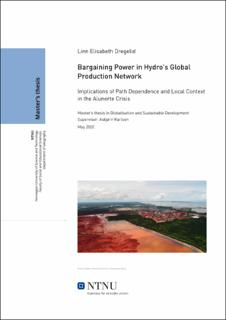| dc.contributor.advisor | Karlsen, Asbjørn | |
| dc.contributor.author | Dregelid, Linn Elisabeth | |
| dc.date.accessioned | 2021-09-28T17:53:48Z | |
| dc.date.available | 2021-09-28T17:53:48Z | |
| dc.date.issued | 2020 | |
| dc.identifier | no.ntnu:inspera:56114793:34431051 | |
| dc.identifier.uri | https://hdl.handle.net/11250/2785176 | |
| dc.description.abstract | Dette kasusstudiet omhandlar gruveindustri. Alumina-fabrikken Alunorte i Barcarena i Nord-Brasil er ein del av Hydro sitt Globale Aluminium Produksjonsnettverk (aluminium-GPN). Etter ein kraftig regnskur i februar 2018, vart lokale innbyggjarar bekymra for utslepp av giftig rødslam frå Alunorte til omkringliggjande natur. I kontrast til tidlegare tilfelle av mistenkte utslepp, reagerte brasilianske myndigheiter umiddelbart, og innførte produksjonsembargo for Alunorte. Alunorte måtte redusere produksjonskapasiteten med femti prosent, noko som førte til store operasjonelle og økonomiske vanskar. Det tok nitten månader før alle embargo var oppheva. Denne forskinga er basert på dokument, og inneheld ei analyse av forhandlingsprosessen mellom myndigheitene og Hydro som fann stad etter hendinga i februar 2018. For å tilføre forklaringskraft, har eg anvendt stiavhengigheit (path dependence) i kombinasjon med GPN-teori. Difor er òg den lokale historia og konteksten i Barcarena ein del analysen.
Resultata syner at GPN-konsepta territorialitet og forankring kan forklare kvifor forhandlingsmakta først favoriserte brasilianske myndigheiter. Vegen tilbake til normale operasjonar var langdryg og kostbar for Hydro, i kontrast til ei liknande, men meir alvorleg, sak om utslepp i 2009, då Vale var majoritetseigar i Alunorte. Hydro si makt var avgrensa av forankring, innlåsing (lock in) og irreversible kostnader (sunk costs). På den andre sida hadde myndigheitene fleire grunnar for å gjere dette til ein vanskeleg situasjon for Hydro. Utsleppa frå Alunorte braut gitte lisensar, noko som opna for moglegheita til å ta grep mot Hydro. Lokal kontekst og historie, kombinert med internasjonal politikk og nasjonalt val, inkludert personleg prestisje, var øydeleggjande for Hydro sine operasjonar i Pará. Nedarva tilstandar og manglande nettverksforankring forsterka dei negative konsekvensane for Hydro. Omsider synte det seg at ressursen arbeid endra forhandlingsposisjonen til Hydro. Alle embargoane var oppheva etter nitten månadar med økonomisk tap og skiftande forhandlingsmakt. Utfallet av forhandlingsprosessen var stiavhengig, understøtta av historie, arv, tidlegare hendingar og irreversible kostnadar, akkumulert over tid. Denne forskinga illustrerer kvifor stiavhengigheit kombinert med GPN er nyttig å anvende ved analyser av forhandlingsprosessar og forklaringsmekanismar. | |
| dc.description.abstract | This-case study is centred around an extractive industry. The alumina factory Alunorte in Barcarena in Northern Brazil is part of Hydro’s Aluminium-Global Production Network. After a heavy rainfall in February 2018, local inhabitants were concerned about emissions of toxic bauxite residue from Alunorte into the local environment. In contrast to previous cases of suspected emissions, the Brazilian authorities immediately took action, and imposed production embargoes on Alunorte. Alunorte had to reduce their production capacity by fifty percent, causing severe operational and economic difficulties. It took nineteen months before the final embargo was lifted. This research is based on documents, and contains an analysis of the bargaining process between the authorities and Hydro that took place after the incident. To provide explanatory power, I have applied path dependence in combination with GPN-theory. Thus, the local context and history of Barcarena have also been a part of the analysis.
The results show that due to GPN-concepts of territoriality and embeddedness, the bargaining power first favoured the Brazilian authorities. The return to normal operations was a long and expensive process for Hydro, in contrast to a similar, but more serious emission in 2009, when Vale had the majority ownership of Alunorte. Hydro was constrained by embeddedness, lock in and sunk costs. And the authorities had several reasons to make this a difficult situation for Hydro. Alunorte’s emissions violated licences, which provided the opportunity to act against Hydro. The local context and history, combined with international politics and national election, including personal prestige, were detrimental for Hydro’s operations in Pará. Legacies and lack of network embeddedness reinforced the negative consequences for Hydro. Eventually, the asset of employment changed the bargaining position of Hydro. All embargoes were lifted after nineteenth months of economic losses and shifting bargaining power. The outcome of the bargaining process was path dependent, resting on history; legacies, past events and the sunk cost of investment, accumulated over time. This research illustrate why path dependence in combination with GPN is useful to apply in analyses of bargaining processes and causal explanations. | |
| dc.language | | |
| dc.publisher | NTNU | |
| dc.title | Bargaining Power in Hydro's Global Production Network. Implications of Path Dependence and Local Context in the Alunorte Crisis. | |
| dc.type | Master thesis | |
